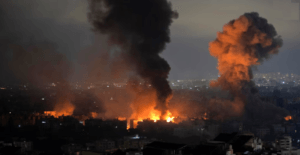Middle East on Edge: Iran Threatens Nuclear Retaliation as Gulf Nations Refuse to Support Israeli Strikes
Iran has warned of nuclear retaliation against Israel if it targets its nuclear facilities, following escalating tensions after an Iranian missile attack. Gulf nations, concerned about the potential disruption to oil exports and regional stability, have refused to support any Israeli military action against Iran. Meanwhile, the U.S. has imposed new sanctions on Iran’s oil sector to hinder its missile programs and destabilizing activities.
CONTENTS:

Middle East on Edge: Iran Threatens Nuclear Retaliation as Gulf Nations Refuse to Support Israeli Strikes
Iran threatens nuclear retaliation if Israel attacks
A senior adviser to Iran’s Supreme Leader, Ayatollah Ali Khamenei, Brigadier General Rasoul Sanaei-Rad, warned Israel against striking Tehran’s nuclear sites in retaliation for the missile barrage on October 1. He stated that Iran might reconsider its nuclear strategy if Israel targets its facilities. This follows growing pressure from some Israeli officials urging Prime Minister Benjamin Netanyahu to take military action against Iran’s nuclear program.
Iran warns allies against aiding Israel in attacks
Middle East on Edge: Iran Threatens Nuclear: Iran has issued a strong warning to its Arab neighbors and U.S. allies in the Gulf, threatening severe retaliation if their territories or airspace are used to assist Israel in any attacks on Iran, according to the Wall Street Journal. The message, delivered via secret diplomatic channels, was aimed at oil-rich nations like Saudi Arabia, the UAE, Jordan, and Qatar, all of which host U.S. military forces.
This warning follows Israel’s vow to retaliate harshly against Tehran after an Iranian ballistic missile strike on Israel earlier this month. Israeli officials, angered by the attack, have called for strikes on Iran’s nuclear or oil infrastructure, seen as key to weakening Tehran’s military aggression. In response, Iran has threatened to target Israel’s civilian infrastructure and any Arab states that might help in an Israeli or U.S.-led assault.
Gulf nations fear oil disruptions, refuse to aid Israel
Middle East on Edge: Iran Threatens Nuclear: According to the Wall Street Journal, Gulf nations have informed the Biden administration that they are unwilling to be drawn into a broader conflict by allowing their military infrastructure or airspace to be used in strikes against Iran. Officials from these energy-rich states are concerned that their oil facilities, typically considered under U.S. protection, could become prime targets if hostilities escalate. With a large presence of U.S. troops in the region, any military action could also endanger American forces.
A key worry for Gulf states is the potential disruption to the global oil market if conflict intensifies. A full-scale war between Israel and Iran could severely impact oil exports passing through the Strait of Hormuz, a vital artery for global energy supplies. Such disruptions could cause energy prices to soar, destabilizing both regional and global markets. As a result, Arab leaders, including those from Saudi Arabia and the UAE, have vowed to avoid involvement in any military strikes against Iran, fearing the risks to their oil infrastructure.
US imposes new sanctions on Iran’s oil sector
Middle East on Edge: Iran Threatens Nuclear: In response to rising tensions, the U.S. has imposed new sanctions on Iran’s oil and petrochemical sectors, specifically focusing on Iran’s “shadow fleet” of ships used to evade existing sanctions. The U.S. Treasury and State Departments targeted several companies and vessels involved in the transportation of Iranian oil, as part of a broader strategy to cut off funding that supports Iran’s missile programs and regional militias.
“These sanctions are aimed at disrupting Iran’s efforts to divert energy revenues toward financing its dangerous and destabilizing activities, including the advancement of its nuclear program and ballistic missile proliferation,” said U.S. Treasury Secretary Janet Yellen in a statement.
The escalating tensions are straining the delicate alliances between Arab states and Israel. While these nations share a mutual interest in countering Iran’s influence, they are hesitant to get drawn into a direct military conflict that could destabilize the entire region. Some Arab countries, such as Jordan, have cooperated with Israel and the U.S. in the past, including intercepting Iranian missiles aimed at Israel earlier this year. However, supporting a full-scale Israeli strike on Iranian territory is viewed as a far more perilous move.
Check out TimesWordle.com for all the latest news
You must be logged in to post a comment.